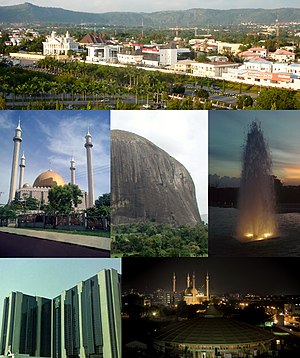From Wikipedia, the free encyclopedia
| Abuja | |
|---|---|
| Capital city | |
| Abuja Municipal Area Council | |

From top (L-R): View of a street in Wuse district,Abuja National Mosque, Zuma Rock, fountain inMillennium Park, Central Bank headquarters, and skyline of CBD at night
| |
| Location of Abuja in Nigeria | |
| Coordinates: 9°4′N 7°29′E | |
| Country | |
| Territory | Federal Capital Territory |
| LGA(s) | Abuja Municipal Area Council |
| Founded | 1828 |
| Government | |
| • Minister | Muhammad Musa Bello |
| Area[1] | |
| • Capital city | 1,769 km2 (683 sq mi) |
| • Land | 1,728 km2 (667 sq mi) |
| • Water | 41 km2 (16 sq mi) |
| Elevation | 840 m (2,760 ft) |
| Population (2011 estimate)[3] | |
| • Capital city | 1,235,880 |
| • Density | 700/km2 (1,800/sq mi) |
| • Urban | 2,440,000[2] |
| • Metro | 3,000,000 (estimated) |
| [4] | |
| Time zone | WAT (UTC+1) |
| Postal code | 900211 to 900288 |
| Climate | Aw |
| Website | abujacity.com |
Abuja (/əˈbuːdʒə/)[5] is the capital city of Nigeria. It is located in the centre of Nigeria, within the Federal Capital Territory (FCT). Abuja is a planned city,[6] and was built mainly in the 1980s. It officially became Nigeria's capital on 12 December 1991, replacing Lagos, though the latter remains the country's most populous city. Abuja's geography is defined by Aso Rock, a 400-metre monolith left by water erosion. ThePresidential Complex, National Assembly, Supreme Court and much of the city extend to the south of the rock. Zuma Rock, a 792-metre monolith, lies just north of the city on the road to Kaduna State.
At the 2006 census, the city of Abuja had a population of 776,298,[7] making it one of the ten most populous cities in Nigeria. According to the United Nations, Abuja grew at the rate of 139.7% between 2000 and 2010, making it the fastest growing city in the world.[8] As of 2015, the city is still experiencing an annual growth of at least 35%, still retaining its position as the fastest growing city on the African continent and one of the fastest in the world.[9] Abuja has witnessed a huge influx of people into the city; the growth has led to the emergence of satellite towns such as Karu Urban Area, Suleja, Gwagwalada, Lugbe, Kuje and smaller settlements to which the planned city is sprawling. The unofficial metropolitan area of Abuja has a population of well over three million and comprises the fourth largest metropolitan area in Nigeria, surpassed only by Lagos, Kano and Ibadan.
Significant sights include the Nigerian National Mosque and the Nigerian National Christian Centre. The city is served by the Nnamdi Azikiwe International Airport. Abuja is known for being one of the few purpose-built capital cities in Africa as well as being one of the wealthiest.[10]




